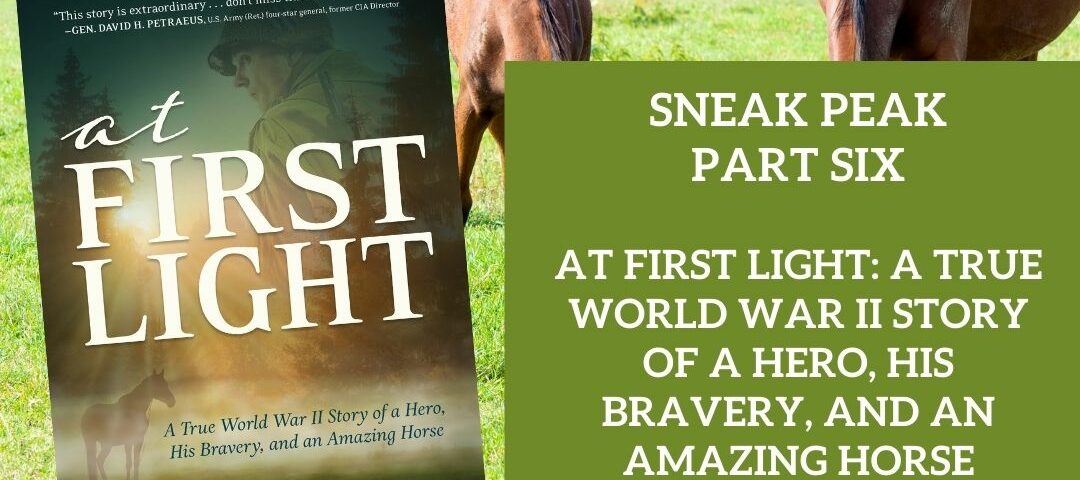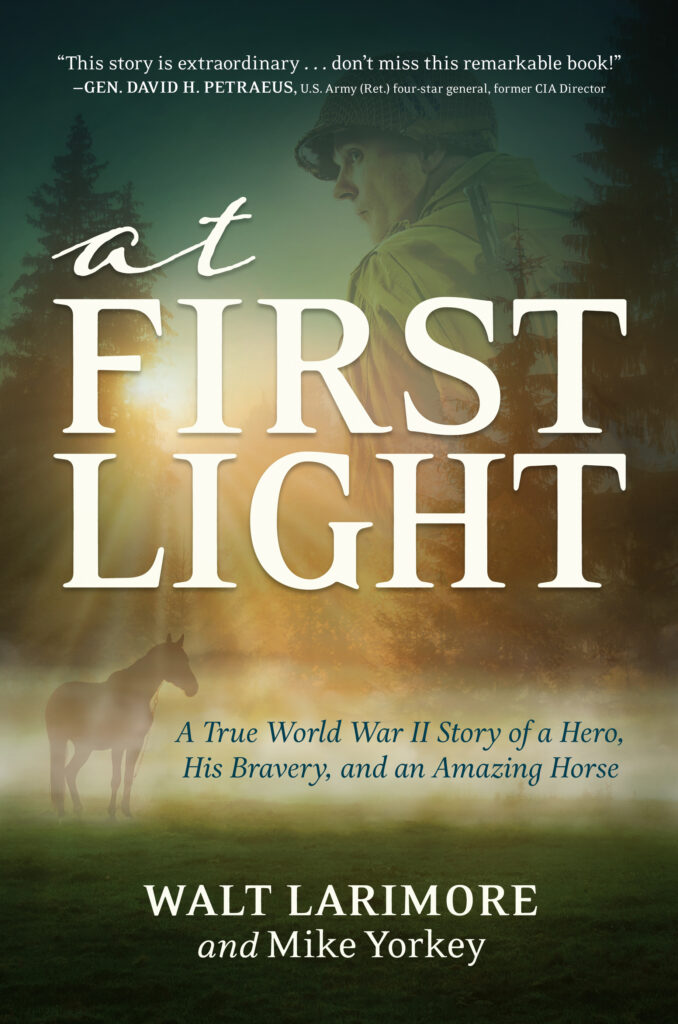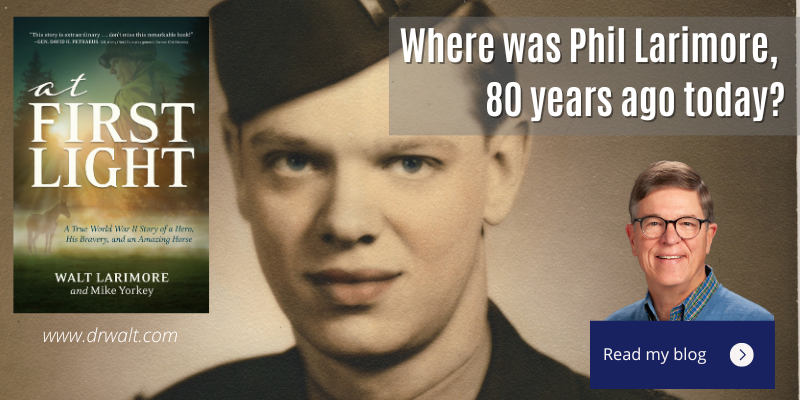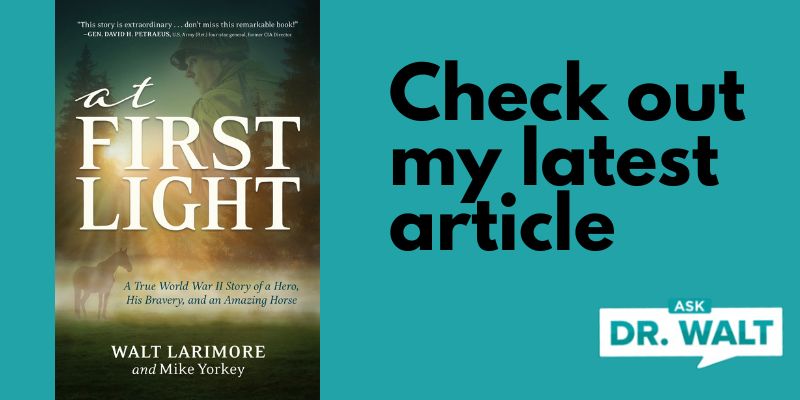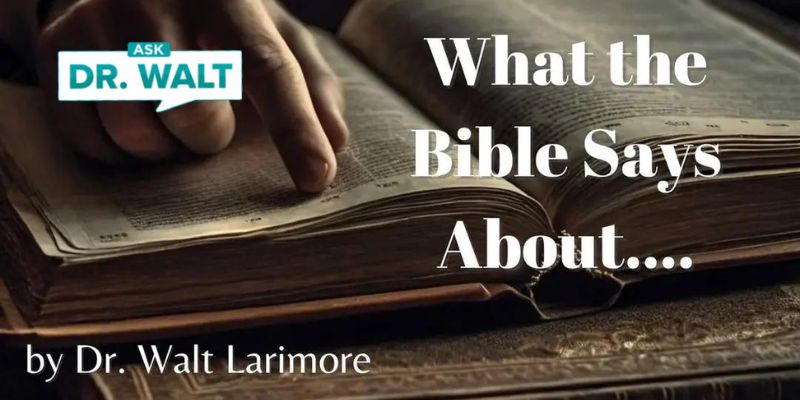SNEAK PEAK – Part Six – At First Light: A True World War II Story of a Hero, His Bravery, and an Amazing Horse

Vaping may lead to inflammatory changes in organs
May 6, 2022
Very nice article featuring my dad and the book about his heroics – At First Light
May 8, 2022SNEAK PEAK – Part Six – At First Light: A True World War II Story of a Hero, His Bravery, and an Amazing Horse
With the permission of my publisher, for the month of April, I’m giving you a SNEAK PEEK of the first five chapters of my latest book — a wonderful story about my father’s heroism and exploits before and after World War II. Here’s CHAPTER FIVE of At First Light: A True World War II Story of a Hero, His Bravery, and an Amazing Horse.
“I love World War II books, and none is better than At First Light. It’s like a combination of Band of Brothers and War Horse—or perhaps a mixture of Unbroken and Seabiscuit. A mesmerizing page-turner not to be missed.”
—Pat Williams, co-founder of the NBA’s Orlando Magic and former general manager of NBA teams in Chicago, Atlanta, Orlando, and the 1983 World Champion Philadelphia 76ers
Order Here
CHAPTER FIVE
CAPTURE THE FLAG
“I remember OCS as being one of the most intense episodes of my life, aside from Infantry combat, which, of course, was what it prepared us for. Our determination to successfully complete the program was the primary goal of our young lives.”
—Russell W. Cloer, an Officer Candidate School graduate
At Fort Benning, there was never any hazing or what the OCS candidates called “chickenshit” from the TOs. But one thing the men all grew to hate was what was called the “F*** Your Buddy Sheet.”
During the last half of their training, the men were required to rank the other men in their platoon in order of officer suitability. For the first five and last five men on their list, each candidate had to write a sentence explaining his justification for the ranking. As one candidate, Russell Cloer, wrote, “There could be no hedging because someone had to be first and someone had to be last. And showing favoritism didn’t pay because we were each rated by the TO on our ability to evaluate others effectively.”
Toward the end of OCS, the officer candidates had to rotate as first-time instructors in subjects they had completed. Their TO and the other students graded them on the quality of their performance. It was during this phase that Phil learned he was a natural teacher. He was primarily encouraged by one of his instructors, 2nd Lieutenant Ross H. Calvert, Jr., from Nashville, Tennessee, who had graduated from OCS a few months earlier and had done so well that he had been invited to stay on the teaching staff.
Although relationships between candidates and staff were discouraged, the two men quickly became fast friends, given their Tennessee roots and mutual love of bourbon, horses, and outdoor sports. Phil and Ross shared meals and drinks at the Officer’s Club during their free time and learned to play contract bridge—a trick-taking card game played by four players, with partners sitting opposite each other. They quickly became one of the best competitive teams on the base, pocketing a fair amount of spending money in winnings. On weekends, they also loved riding together.
At the end of supper one day, Phil’s platoon was unexpectedly ordered to double-time to the barracks. Once there, platoon members were handed field coveralls, a small backpack, a loaded carbine, and a sidearm. Then they were marched in the dark and placed in a large windowless box truck. After being driven around in disorienting circles for about thirty minutes, the truck stopped, and the back gate was slung open.
The TO jumped in. “Gentlemen, I’m going to have you leave the truck in groups of four. As you get off the truck, I’ll assign a squad leader and give you a compass bearing. Follow that bearing to the first road you find, which will be between two and three miles away. You’ll be traversing forests, fields, ravines, and, if you’re unlucky, an alligator-infested swamp with mosquitos and snakes. We have men posing as the enemy scattered between the roads.
Some of them are hunting for you, while others are hunkered down in machine gun nests, waiting to kill as many of you as they can. Your weapons and their weapons have been preloaded with blanks. Feel free to fire at will at the enemy. If you don’t kill him, rest assured he will kill you. There are to be no prisoners in this exercise.”
The TO paused and looked over the men. “Each of the enemy will have a small flag attached to their belt by a rubber band. When you exit the truck, one flag will be attached to your belt. When a man is killed, the killer pulls the band to prove his kill. If you’re killed, your night—and perhaps your training—will be over. But if you either kill or avoid the enemy and achieve your objective, then when you get to the road, I want you to find the nearest stake, pull it up, and write your arrival time on it.
“Each stake is numbered, and your performance will be judged on how close you come to the proper stake and how long it takes you to get there. Bonus points will be awarded for any kills you make. Then stay by the road. You may sleep if you have any time left, but expect to be picked up at zero six hundred hours sharp. And if you’re not at your pickup point at zero six hundred, you will have a long, long walk back to the barracks. Good luck.”
The exercise reminded Phil of a traditional game played at Boy Scout camp after dark, where two teams each had a flag in their home camp. The objective was to capture the other team’s flag and bring it back to your base without getting “killed.” Players were eliminated from the game when a piece of cloth attached to their belts by rubber bands was pulled loose by an enemy combatant.
As Phil and his three teammates exited the truck, the TO assigned him to be the squad leader. Phil felt his stomach tighten and his pulse quicken. One of his squad mates was a Lumbee Indian from Lumberton, North Carolina, whom Phil swore could hear a mouse walking on a carpet of grass at fifty yards. For the two of them, it was a marriage made in heaven.
Other than a minor stumble into an unrecognized but shallow ravine, the group was able to thread its way through the forest quickly and quietly. Fortunately, a Southern forest at night is alive with the booming sounds of tree frogs, pond frogs, bullfrogs, crickets, cicadas, katydids, and even whip-poorwill birds chanting their name, along with any number of other critters.
Phil was glad it was fall so that the echoing chatter could conceal any inadvertent sound he or one of his men might make by stepping on a small twig. A snapping stick could sound like a gun going off in a quiet forest, and point the enemy directly toward them.
While making their way through the woods, the Indian suddenly hand-signaled that they should crouch and be quiet. He listened for a minute and pointed ahead, indicating one hundred yards with hand signals.
Looking across the darkened field, Phil nodded as he saw the red glow of two cigarettes. Using hand signals, he broke the group in two, and they circled the enemy ambush. Approaching from opposite sides, Phil and his men snuck up to within yards of the four men who were in hushed conversation while smoking in a small depression that they had made into a machine gun nest.
Apparently, “the enemy” had not expected the trainees to arrive so quickly. On Phil’s signal, they swarmed over the edge of the nest, gripping sheathed knives. Before the unsuspecting enemy could react, they pretended to cut their throats. To make an even bigger statement, the Lumbee Indian shoved his shocked victim to the ground, placed his knee on the man’s chest, pulled off the man’s cap, and pretended to scalp him. The soldier looked terrified as Phil’s buddy stood over him, softly chanting in his native language as he held the imaginary scalp to the stars.
Phil’s other two men got into the act, whooping and hollering as they “scalped” their victims, but Phil quickly shushed them. They each collected a flag from the men they had “killed” and stuck them in their pockets. As Phil bent over his man, he was startled to see that he had subdued his good friend Ross Calvert.
“Good job!” Calvert whispered through a smile that spread from ear to ear.
Phil grinned and turned to his men. “We need to move quickly!” he said with urgency in his voice. They resumed their speed hike silently through the forest in single file. The Indian led the way, and as he darted from tree to tree, each man would quietly follow in succession. They would stop every five minutes for Phil to pull out his compass and take a reading by moonlight.
The sharp snap of a breaking twig about seventy yards in front of them brought them to a crouch. The three crept up to the Indian. They heard another snap and muffled voices in the distance.
“There’s a patrol just ahead of us,” Phil whispered. “Gents, it’s time to set up an ambush.” He looked at the Indian. “Can you tell the direction they’re walking?”
The man nodded and swept his arm from side to side to show the direction they were traveling.
“Okay, boys,” Phil quietly directed, “on my hand signal, let’s separate. We’ll form a ten-by-twenty-yard perimeter, and when they walk into it, I’ll whistle, and we can all open up with our weapons.”
Then he smiled. “We’ll mow ’em down before they know what hit ’em.”
The ambush went off without a hitch, other than being roundly cursed out by the eight enemy combatants, all of whom were enlisted men out to earn rewards and bragging rights for “killing” the candidates. One of them exclaimed, “You boys literally scared the shit outta us!”
Following their capture, Phil and his men pulled off their flags, pocketed them, and melted into the woods. In short order, they found the right road and the nearest stake. It had taken them only three hours to traverse the course. As much as they could determine, they were the first group out of the woods.
“Time to take a nap,” the Indian said.
But Phil was suspicious that there could still be a trap. “Let’s pull up our stake and move back into the woods a bit. We’ll still be near enough to the road to hear the trucks when they come. We’ll rotate watch every hour. Two men up; two asleep. Just to be safe.”
Phil sensed the men’s dissatisfaction with his decision, but they quickly pulled off their field packs and used them for pillows, and the first two men immediately fell asleep. Phil and the Indian took the first watch.
Slowly, other men came out of the woods, pulled up their stakes, and lay down to sleep. After his first watch, it was Phil’s turn to nap.
Just before dawn, one of the men shook Phil from his sleep. He pointed across the road. They could see “the enemy” exiting the woods, one man every ten yards. They all moved into the ditch across the pavement from the sleeping trainees. Then one blew a whistle, and the enemy charged across the road, their guns blasting away. All of the asleep men were “killed.” Cries of cursing erupted up and down the road as the candidates realized the tables had been turned, and they had been caught in an ambush of their own.
The enlisted men laughed and hooted—that is, until Phil and his men, who had spread out twenty to thirty yards apart, came running out of the woods on his whistle with their rifles and pistols erupting in a cacophony of fire. The “dead” OCS candidates began cheering as they realized one of their teams had the final hurrah.
The victorious outcome energized Phil and gave him confidence that he could successfully lead men and hopefully survive the many battles that lay ahead.
Order Here
© Copyright WLL, INC. 2022.

